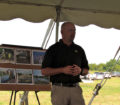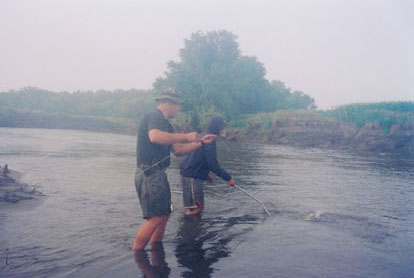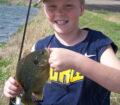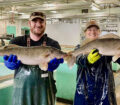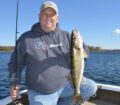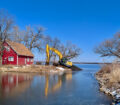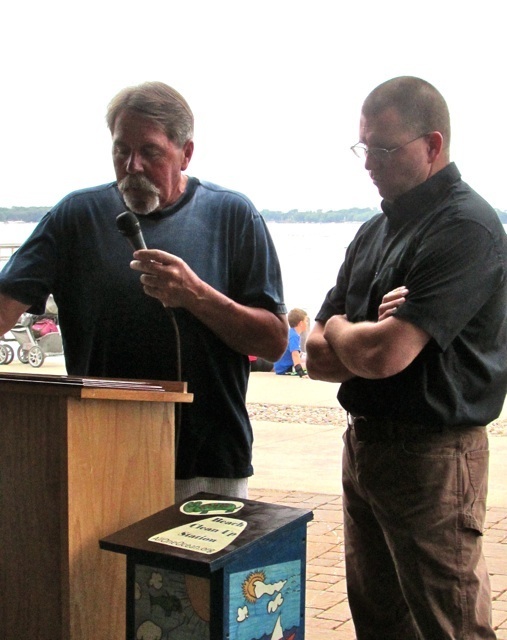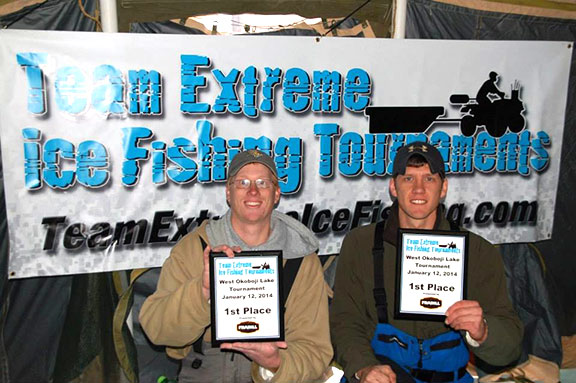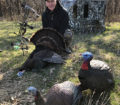By Steve Weisman
 Although there were many highlights at the recent Okoboji Blue Water Festival held on Saturday, August 11 at the Green Space, one of the most anticipated events was the water quality/Natural Resources protection issues panel discussion. With Bill Maas, president of the East Okoboji Lake Improvement Corporation and John Lundell, chairman of the Clear Creek Watershed Management Association and mayor of Coralville, acting as co-moderators, the panelists spent the better part of two hours in a spirited give and take over key environmental issues.
Although there were many highlights at the recent Okoboji Blue Water Festival held on Saturday, August 11 at the Green Space, one of the most anticipated events was the water quality/Natural Resources protection issues panel discussion. With Bill Maas, president of the East Okoboji Lake Improvement Corporation and John Lundell, chairman of the Clear Creek Watershed Management Association and mayor of Coralville, acting as co-moderators, the panelists spent the better part of two hours in a spirited give and take over key environmental issues.
Although several topics were covered, this column will deal with three of the hottest topics: Iowa’s voluntary nitrogen reduction plan, recent clean water legislation (File 512) and lack of funding for IWILL.
Panelists included Cindy Lane, Water Program Director for the Iowa Environmental Council; Joe McGovern, president of the Iowa Natural Heritage Foundation; David Osterberg, professor emeritus of Environmental Health at University of Iowa and part of the Iowa Policy Project; Mary Skopec, director of the Iowa Lakeside Laboratory; Sean McMahon, executive director of Iowa Agriculture Water Alliance; Bill Stowe, general manager of Des Moines Water Works; Bruce Trautman, interim director of the Iowa Department of Natural Resources.
Each panelist gave a brief personal overview before the first topic was posed: how successful do you think the state’s voluntary nitrogen reduction plan has been? Answers varied with McMahon saying, “You know eight years ago there were only maybe about 10 thousand acres of cover crops that were cost shared in Iowa and then this last fall we had 760,000 acres in total. So is that enough cover crops? Absolutely not! But if you look at the entire state of Iowa’s row crops, 23 million acres, we’re only at 3 percent of all those row crop acres. We’d actually like to see between 12 million and 17 million acres of cover crop.”
Trautman agreed, noting, “I’m not going to sit here and believe for one minute that voluntary conservation doesn’t work, if you do the right things and if you have the right people and if you take the watershed approach, it works. I’m not going to apologize for the work that’s been done in the past, but I’m not going to say we’re done.”
Lane, however, does not think the voluntary option is working. “Recent research has shown that instead of reducing our nitrate loads that are coming out of Iowa, because all of the nitrogen reduction strategy, researchers have found that our nitrate loads are increasing. “She also noted that when conversations like this begin, “It turns right away to finger pointing. We need to work together to make changes.”
Skopec expressed concern about current weather changes and how these changes affect all of the landscape. “How does our land handle six-inch rains in March and April when we do not have landscapes that are protected? Those soils are much more vulnerable now than they were even 50 years ago.”
Stowe, meanwhile, was the most critical of the voluntary nitrogen reduction plan. “It’s a failure. Where we are right now, nothing has changed in the past five years on our rivers.”
This discussion led moderators to ask about the panelists’ thoughts on the Iowa Legislature’s recent Clean Water Legislation (SF 512), which authorizes $282 million to water quality initiatives over the next 12 years. It is not new money but rather diverts existing tax money on metered drinking water as well as gambling revenue to fund the legislation.
Trautman did feel that this legislation is a start. “If you have people upstream and downstream working together, it works.”
Unfortunately, the consensus of the panelists was this is not enough. Osterberg said, “It’s not new monies. It’s just transferring funds. As long as you say we can’t do anything unless we take away from schools you’re not going to get very much money. Therefore, I think the process ought to be let’s decide that we’re serious about doing something about water quality and then let’s put some money into it, and let’s put a tax on fertilizer where it out to be.”
McGovern agreed. “The $2 million in the funding bill falls far short of what is needed. It can’t do anything. It’s just not enough. We did a project on Big Spirit that cost $1.6 million, and we did it all with private money. One project! So, they’re going to spread that over the state. So, I just think we deserve way better than what we saw out of SF 512. We had a chance to do much, much more and that was what we got out of this session.”
Stowe also criticized the measure. “Sprinkling money around the state for ribbon cuttings is not the answer. We need to ask what is this money going to? What is the target? What is the return to the state? What is the environmental impact? What is our investment and what is the return on investment?”
When it came to the topic of IWILL, also known as the Natural Resource and Outdoor Recreation Trust Fund, panelists in general agreed on its concept, and the audience applauded its support and belief in its importance to all Iowans. Approved by 63 percent of Iowa’s voters in 2010, with the next penny increase in the state sales tax, 3/8 of that penny will go to fund IWILL to the tune of at least $150 million.
Lane spoke passionately for funding IWILL because it would benefit all areas of the state. “How do I improve where I grew up? As a young mother, I ask what is the future for my child? It will take time even at $150 million per year.”
McMahon agreed and challenged Iowa legislators to pass IWILL. “Our neighbors to the north (Minnesota) and to the south (Missouri) did this, and we still sit waiting- for eight years! This should not be a partisan issue; this should be nonpartisan.”
McGovern reflected on what might have been, “You know if we had funded IWILL the year it was passed, we would have already had $1.1 billion funded into the trust fund. We have lobbied, asked Iowans and polled them and even in our latest poll, 72 percent said to fund IWILL. However, we are always given an excuse and told next year. What will it take?”
Certainly, panelists addressed more environmental questions, but these were their thoughts on three extremely important topics for all Iowans. Festival organizer Greg Drees expressed his thanks to both panelists and the crowd that attended the panel discussion. “I appreciate the candidness with which each panelist answered questions. Even though at times their answers caused disagreement among the panelists, their answers showed their passion for the topic of water quality. At the same time, we had an excellent crowd that was actively engaged throughout the two-hour panel discussion. The topic of clean water is so important to the state of Iowa. I only hope that this discussion helps get more Iowans involved in the due process and sharing their viewpoint with both clean water experts and the legislature.”

